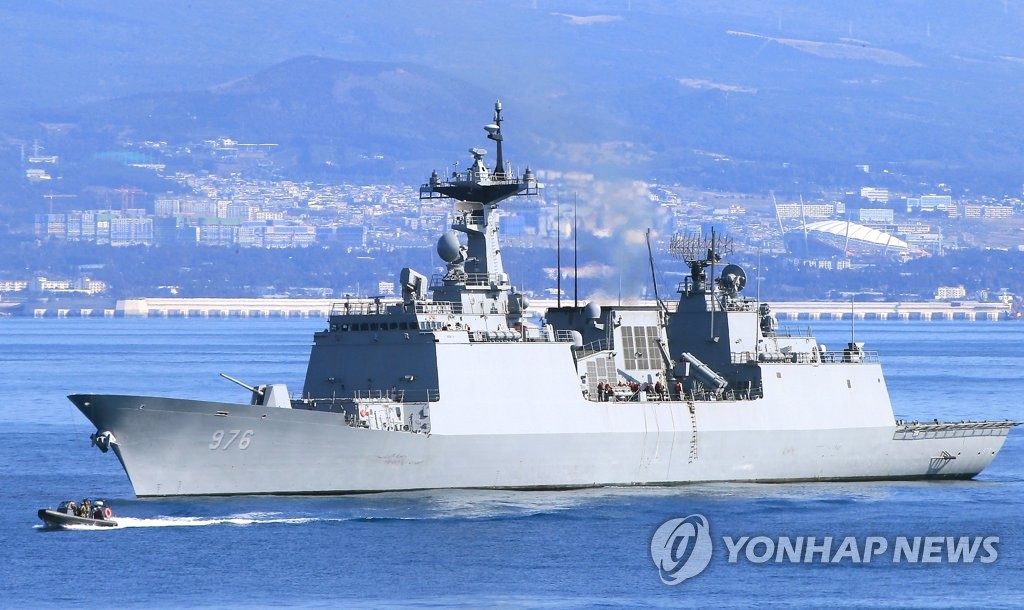 |
| ▲ This undated file photo shows South Korea's 4,400-ton destroyer Munmu the Great. (Yonhap) |
(3rd LD) Cheonghae unit-coronavirus
(3rd LD) Cheonghae anti-piracy unit off Africa reports 6 COVID-19 cases
(ATTN: ADDS more info in paras 2, 5-6; UPDATES with minor edits)
By Choi Soo-hyang
SEOUL, July 15 (Yonhap) -- Six service members aboard a South Korean destroyer on anti-piracy missions off the coast of Africa have tested positive for the coronavirus, the defense ministry said Thursday, sparking fears of collective infections among some 300 people living on the same vessel.
President Moon Jae-in ordered the mobilization of an aerial tanker to provide swift medical support to the infected troops and to bring them back home without delay if they cannot receive necessary treatment, the presidential office said.
The infections appeared to have begun after the 4,400-ton Munmu the Great carrying the Cheonghae Unit was docked at a nearby port from June 28-July 1 to load supplies, and poor initial response to suspicious symptoms could have spread the virus, according to a ministry briefing.
One sailor showed symptoms of a cold on July 2, a day after the destroyer left the port. But he was only given cold medicine. About 40 others later developed cold symptoms too and were tested for the virus Saturday with rapid test kits, instead of more accurate PCR tests, but all tested negative at that time.
It was only after samples from six sailors with symptoms were sent three days later to a nearby country for PCR tests that they were all found to be infected with the virus, according to officials.
In addition to the six, one officer showed symptoms of pneumonia and was transferred to a civilian hospital where he was expected to undergo a virus test, officials said.
The number of infections could further rise, as naval vessels have many confined spaces and none of the members at the 34th contingent of the Cheonghae Unit received coronavirus vaccines. They embarked on the mission in early February before the military began a full-fledged vaccine campaign later that month.
Around 80 crew members are currently under cohort isolation after showing symptoms.
The ministry said it is communicating with a nearby diplomatic mission to carry out virus tests on all the members aboard.
"We consider the situation to be very serious. Our top priority will be the safety of our members and the prevention of the further spread of the virus," a Joint Chiefs of Staff officer said.
The Cheonghae Unit has been on anti-piracy missions in the Gulf of Aden off Somalia's coast since 2009, and it recently expanded the mission areas to include the Strait of Hormuz.
Among some 1,300 troops on overseas missions, 960, or 73 percent, have been fully vaccinated, according to the ministry.
All 300 members of the 35th contingent, which departed from the southeastern port of Busan last month to replace the 34th, have also been fully vaccinated, the ministry said.
Meanwhile, five more newly enlisted soldiers at an Army boot camp in the central city of Nonsan have tested positive for the new coronavirus after a mass infection broke out at the base, bringing the total number of infections recently reported there to 113.
Two Army officers, respectively based in Anyang, south of Seoul, and the northeastern county of Inje, were also confirmed to have contracted the virus.
The total caseload reported among the military population rose to 1,174.
The newly confirmed patients at the Cheonghae unit were not included in the tally as service members on overseas missions are not considered domestic cases to be monitored by the health authorities.
In South Korea, 356,902 troops in their 20s, or 90 percent of the age group, had received their second doses of Pfizer's coronavirus vaccine as of Wednesday.
(END)
(C) Yonhap News Agency. All Rights Reserved

























![[가요소식] 솔비, 13년째 보육원 찾아 봉사활동](/news/data/20251223/yna1065624915963288_822_h2.jpg)








